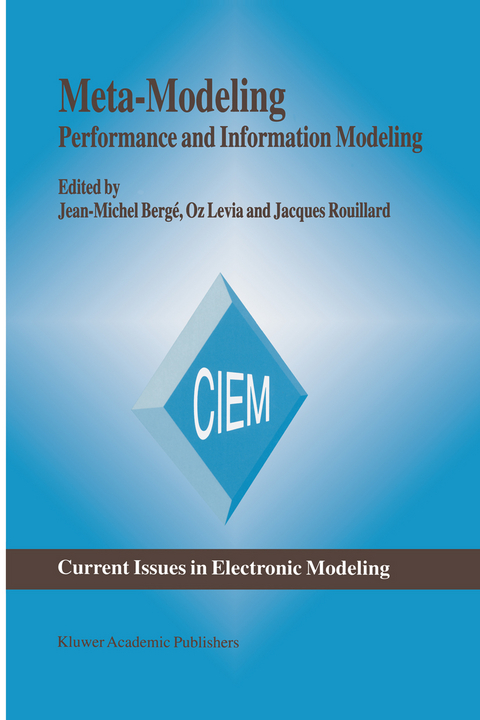
Meta-Modeling
Springer-Verlag New York Inc.
978-1-4612-8580-9 (ISBN)
Performance Modeling
When it comes to design choices and trade-offs, performance is generally the final key. However performance estimations have to be extracted at a very early stage in the system design. Performance modeling concerns the set of tools and techniques that allow or help the designer to capture metrics relating to future architectures. Performance modeling encompasses the whole system, including software modeling. It has a strong impact on all levels of design choices, from hardware/software partitioning to the final layout.
Information Modeling
Specification and formalism have in the past traditionally played little part in the design and development of EDA systems, their support environments, languages and processes. Instead, EDA system developers and EDA system users have seemed to be content to operate within environments that are often extremely complex and may be poorly tested and understood. This situation has now begun to change with the increasing use of techniques drawn from the domains of formal specification and database design. This section of this volume addresses aspects of the techniques being used. In particular, it considers a specific formalism, called information modeling, which has gained increasing acceptance recently and is now a key part of many of the proposals in the EDA Standards Roadmap, which promises to be of significance to the EDA industry. In addition, the section looks at an example of a design system from the point of view of its underlying understanding of the design process rather than through a consideration of particular CAD algorithms.
Meta-Modeling: Performance and Information Modeling contains papers describing the very latest techniques used in meta-modeling. It will be a valuable text for researchers, practitioners and students involved in Electronic Design Automation.
1. Integrating Operational Specification with Performance Modeling.- 1.1. Introduction.- 1.2. Design Methodology Supporting Model-Continuity.- 1.3. Integrated Simulation of Statecharts and ADEPT.- 1.4. Functional Timing.- 1.5. Performance Annotation.- 1.6. Conformance.- 1.7. Results.- 1.8. Summary and Conclusions.- Appendix A:.- Appendix B: ADEPT.- Appendix C: VHDL.- Appendix D: Implementation of Methodology.- 2. A System-Level Performance Model and Method.- 2.1. Introduction.- 2.2. Objective of System Performance Modeling.- 2.3. Related Works.- 2.4. Presentation of the Method.- 2.5. Criteria and Qualities of a Performance Model.- 2.6. Main Concepts of the MCSE Performance Model.- 2.7. Description of the Structural Model.- 2.8. Description of the Behavioral Model.- 2.9. Performance Modeling Process: an Illustrative Example.- 2.10. Performance Evaluation with VHDL.- 2.11. Comparison with Other Models.- 2.12. Benefits of our Approach.- 2.13. Conclusions.- 3. A View of Information Modelling.- 3.1. Information Modelling.- 3.2. The Anatomy of an Information Model.- 3.3. Syntactic versus Semantic Modelling.- 3.4. Modelling Issues.- 3.5. Building a Model of 2D Euclidean Space.- 3.6. Model Validation.- 3.7. Qualitative versus Quantitative Navigation.- 3.8. Building a Model of Time.- 3.9. Modelling Perspectives.- 3.10. Model Hierarchies.- 3.11. Integrating Models.- 3.12. Applications.- 3.13. Conclusions.- Appendix A: Validating the Space Model.- Appendix B: Validating the Time Model.- 4. A Methodology for the Specification of Transformations between Information Models.- 4.1. Introduction.- 4.2. Related Work.- 4.3. Express.- 4.4. The Core Model Methodology.- 4.5. Information Models of CFI and EDIF.- 4.6. A Core Model for EDIF and CFI.- 4.7. Conclusions.- 5. Modeling Design Data and Design Processes in the PLAYOUT Cad Framework.- 5.1. Introduction.- 5.2. Product Model.- 5.3. Task Model.- 5.4. Flow Model.- 5.5. Combining Data and Process Management.- 5.6. Conclusions.
| Reihe/Serie | Current Issues in Electronic Modeling ; 6 |
|---|---|
| Zusatzinfo | XVIII, 192 p. |
| Verlagsort | New York, NY |
| Sprache | englisch |
| Maße | 160 x 240 mm |
| Themenwelt | Mathematik / Informatik ► Informatik ► Software Entwicklung |
| Mathematik / Informatik ► Informatik ► Theorie / Studium | |
| Informatik ► Weitere Themen ► CAD-Programme | |
| Technik ► Elektrotechnik / Energietechnik | |
| ISBN-10 | 1-4612-8580-1 / 1461285801 |
| ISBN-13 | 978-1-4612-8580-9 / 9781461285809 |
| Zustand | Neuware |
| Haben Sie eine Frage zum Produkt? |
aus dem Bereich


